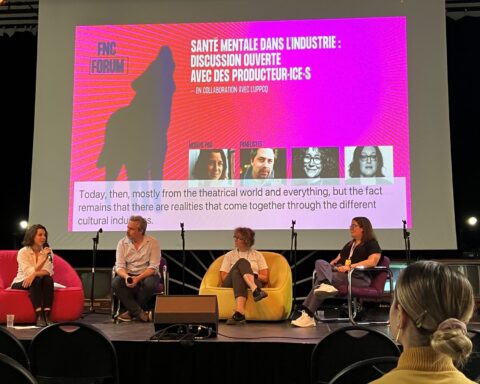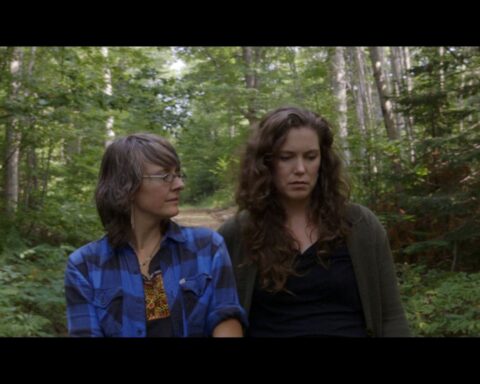As Frederic Bohbot tells it, his beginnings in documentary filmmaking were awfully strange. It was 1997, and Bohbot, then doing a communication studies degree at Concordia University, was enrolled in an international relations class taught by Adalbert Lallier. Bohbot didn’t know it at the time, but Lallier had served in the Waffen-SS, the elite Nazi police force, during WWII. Lallier chose to confess his wartime activity during one of the classes, and asked the students to vote on whether or not he should continue to teach them, given their knowledge of his troubled past.
As it turned out, the students voted overwhelmingly to keep Lallier on. But not surprisingly, once word got out to the rest of the university community, many were not so forgiving. Lallier conceded that, in the final years of the war, he witnessed the gunning down of seven Jews, but, like many, did nothing.
Bohbot was haunted by Lallier’s past actions and, finding himself in the midst of a controversial scandal, decided to turn the story into a documentary film. The result, Once a Nazi…, is a powerful doc, one that captures the complicated dimensions of the story. It toured the festival circuit, and critics and audiences alike could see Bohbot was a force to be reckoned with. He took a subject that was deeply political but also very personal and translated it into a thought-provoking, open-ended film. Not too shabby for a first bow. And since his first film’s 2006 premiere at the Rencontres Internationales du documentaire de Montreal (RIDM), Bohbot’s production house, Bunbury Films, has morphed into one of the busiest documentary think tanks in Quebec.
This year Bunbury will produce four documentaries on a variety of subjects. Directed by Brett Story, Land of Destiny profiles a group of workers who toil in southern Ontario’s “Chemical Valley”, churning oil into plastics at temperatures of more than a thousand degrees. By contrast, Bill Stone’s Work in Progress follows one artist as he tries to complete a massive creative undertaking. In Cameron Esler and Tadzio Richards’ Burning Water, the townsfolk of the Rosebud River valley, outside of Calgary, become alarmed when they realize their water can actually be lit on fire. They agree on one thing: there’s gas in their water, but no one can be sure how it got there. And in Evan Beloff’s Underdog Plaza, the filmmaker follows the personal and professional ups and downs of Dierry Jean, an ambitious boxer striving to make it in the sport.
It’s an eclectic mix, but Bohbot insists there’s a connection. “At first glance, none of these releases have much in common,” he says. “But surprisingly, and by no specific intention, they are all about work in one way or another. Burning Water is an environmental film about a small community but it deals with the choices that community makes, which has a great deal to do with their livelihood. Land of Destiny is about a community that accepts disease, and even, in some cases, death as a tradeoff for having work at a decent income.
Underdog Plaza deals with hard work and sacrifice, while Work in Progress is about expectations in life and appreciation of life through work.” Bohbot, who lives and works in Montreal’s Mile End district, says he confronts the classic dilemma faced by documentary filmmakers everywhere. In order to make films, one needs to get financial backing, but some of the projects that most intrigue Bohbot are ones that don’t necessarily sound like the most commercially viable.
Bohbot hopes for the elusive nirvana: idealism with benefits. He describes one of his high points as when he was able to forge ahead with several productions, even one that seemed a difficult uphill battle. “At the end of our third film, Leaving the Fold [about Hasidic Jews who were leaving the lifestyle and their communities behind], I was able to pay off all the debt from the first film, Once a Nazi…. I was spinning off of that with three films in production at the same time and had enough liquidity and cash flow to have a small staff to develop projects we loved and even invest in a daring project like Work in Progress. That might sound ridiculous, but I felt a lot of pride in being able to invest in a film I love for artistic rather than fiscal reasons. This went against the advice of my accountant, lawyer and key staff members. It was a bad business decision, but my gut tells me it was the right one and I expect to be vindicated one day.”
Bohbot says that part of Bunbury’s strength is that the filmmakers have pitched their own ideas. “We develop and refine the ideas together, but the idea was always conceived of by the director.” Evan Beloff, who has worked with Bohbot on several productions, says one of Bohbot’s key qualities as a producer is his utter bluntness. “He’s extremely demanding,” Beloff reports. “He challenges you in every way. He’s a bit of a hard-ass, but that’s why I respect him. When you work with Frederic, you know you’re working with someone who is looking at the possibilities, who is holding out for the best parts of my talent.”
Bohbot credits much of his current success to mentorship he received when he first started out. “I wouldn’t be doing what I’m doing were it not for the generosity of certain local filmmakers. Nobody would give me a job in the beginning. I knew no one and I had no experience in the industry—and having been a supervisor in a bank’s call centre for years made everyone fearful of hiring me into an entry-level position.
“But Magnus Isacsson gave me as much work as he could find for me and also lent me much of the gear to make Once a Nazi… Through Magnus I met Martin Duckworth, who lent me the camera. I’m convinced that without their help and generosity I would not have had the opportunity to do that hard work. Without those guys at the beginning I’d still be in a bank job, working in the TD tower in Toronto, contemplating jumping out the window.”
Like many a documentary filmmaker, Bohbot also has his rants about government funding policies for those who make non-fiction films. “The toughest thing about documentary filmmaking is finding a way to make them. The responsibility and existence of documentary as a cultural industry in Canada was relegated to the television industry years ago. I think there is a dichotomy between the television industry and the notion of being purveyors of culture. Television is a business and cultural creation is not. Their purposes are in constant opposition. Filmmakers want to make a certain statement that often doesn’t work for television, and proof of that can be seen in the current state of the documentary business in Canada.
“Most of the programming for independent producers has been cut,” he continues. “CBC no longer commissions independent docs that don’t fit into a very specific framework. CTV used to make a measly four or five a year, but they cut that two years ago. Global made some attempts at creating a documentary strand and quickly cut it. Quebec still has Radio-Canada and Télé-Québec, Canal D and other networks, but without the big three, they can’t sustain a documentary on their own. I’m hearing that a number of English-Canadian filmmakers are now conceiving their films in French in order to get the Quebec broadcasters to fund their projects rather than the English ones.”
Bohbot is especially disappointed in the tax policies for doc filmmakers. “Tax credits should no longer be part of our financing structure. I’m still relatively new to the industry—I got here in the past five years—so when I arrived I just accepted that that was the reality,” he says. “But two years ago I learned that tax credits were conceived of as a bridge to allow producers and production companies to have a basic liquidity in between productions—so that when you finished three films in one year you wouldn’t find yourself broke when they were done and having to consider shutting down. But broadcasters now put into their contracts that producers must invest 95 per cent of our tax credits into a film’s budget. One could accuse a producer who finds himself with no money at the end of a production of mismanaging his finances, but if you produce films honestly and put the money into the film as your budget dictated, you will find yourself with no money at the end. Is the only way to maintain liquidity at the end of a production to produce films not entirely on the level? Must we be dishonest with public funds in order to survive beyond the end of a film?”
Bohbot says he recognizes that answers to these issues are not easy. “What’s the solution? More money from broadcasters, more CMF funds, more cultural funds? All this is currently being phased out by government and television broadcasters. In the current climate, increasing cultural funding will certainly not be happening. So what’s the solution for me? I’m moving from documentaries and into fiction features and TV series. I will produce generic TV and reality shows in order to fund the projects I think are important.”
Bohbot stops to take a breath. I ask the question that next springs to mind: are you bitter? “No, what I say is not said with bitterness. Disappointment, yes. I’m a businessperson. I understand business decisions. I’m disappointed that Canadian docs get lower ratings than those internationally acquired for one-tenth the price. But a network like the CBC has been forced to make business decisions over cultural decisions, yet they are a public broadcaster who has been mandated to produce culture. Talk about schizophrenia! I don’t like the answers I get from TV executives, but I see where they’re coming from. There is almost no one in Canadian TV who will take a chance anymore. You see the same directors and the same actors in everything in English Canada because that’s what the funders and bureaucrats are comfortable with. At times it feels so very Canadian.”
Making documentaries is tough enough, says Bohbot. “Their very nature makes them tough—reality, not knowing what’s going to happen next, unpredictable characters and stories—but the toughest thing is financing them.”
And then comes the final irony. At the very moment when Bunbury Films has such a promising lineup of projects, when critical acclaim and the accompanying crucial buzz appear to be adding up to a bonanza, Bohbot says they’re also hit with insecurity. “In a sense, the low point might be right now, at a time when we seem to be flying high. We’ve got two films coming out, just finished a third, and a fourth is soon to be completed, yet because of the financing system in Canada our cash flow is devastatingly low and without a new film being green-lit by a broadcaster we could conceivably be out of business in a few months.
“It’s a very schizophrenic feeling. You’re high on success, but not able to really take it in.”











